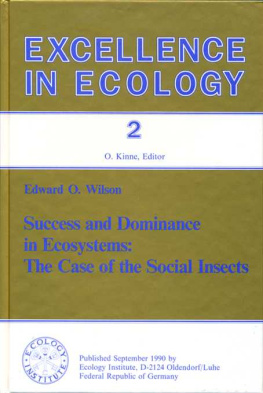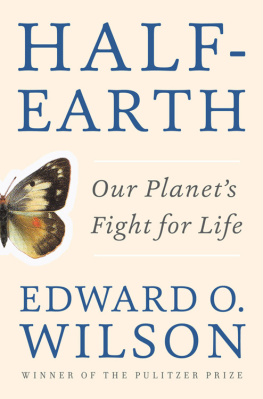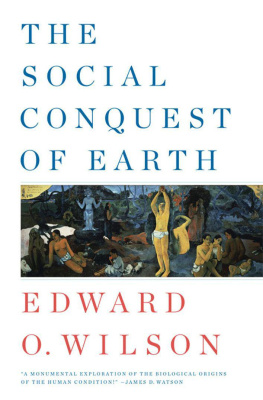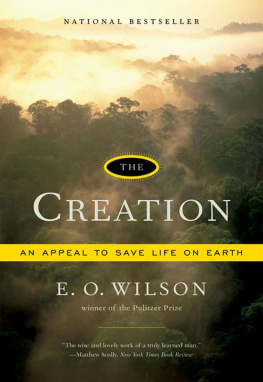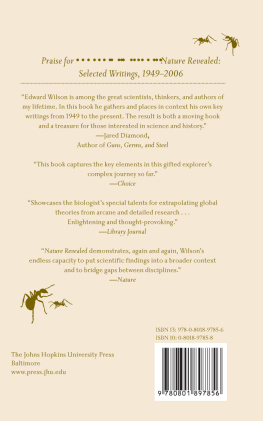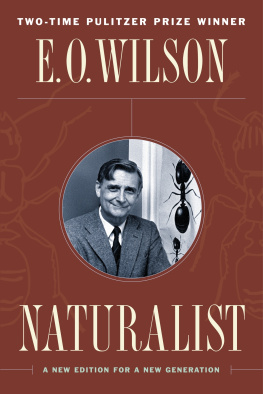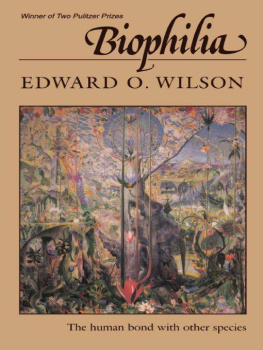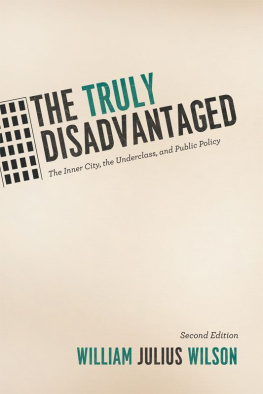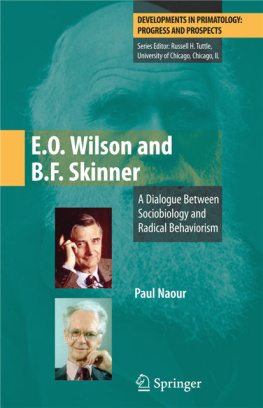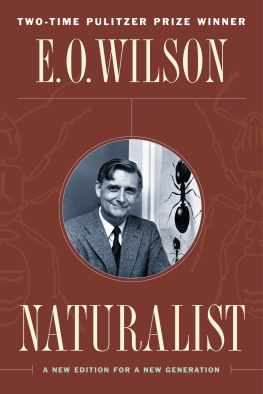Introduction
O. Kinne
Ecology Institute, Nordbiinte 23, D-2124 Oldcndorf/Luhe, Federal Republic of Germany
Excellence in Ecology (EE) presents books authored by noted ecologists of our time: the recipients of the Ecology Institute Prize. EE is published by the international Ecology Institute (ECI) which presently has a staff of 41 marine, terrestrial and limnetic research ecologists all of high professional reputation. Every year a jury composed of ECI members selects - in a rotating pattern - prize winners among marine, terrestrial or limnetic ecologists. Director and scientific staff members receive no remuneration. EE books are made available world-wide at cost price; a large number of books is donated to libraries in Third-World Countries.
The Ecology Institute
The Ecology Institute strives to (1) further the exchange of information between marine, terrestrial and limnetic ecologists; (2) compensate for the lack of balance between analyzing and synthesizing research efforts and thus help to provide more feedback and critical overview for ecological sciences; (3) draw the attention of scientists, administrators, politicians and the general public to important issues resulting from ecological research; (4) assist in finding a long-term compromise between the increasingly destructive potential of modern industrial societies and the need for defining and applying measures to protect nature, commensurate with achieving and sustaining the highest possible living standard for human societies. [Page x]
ECIs aims and activities have been described more fully in the foreword to Book 1 as have been the procedures for selecting and awarding ECI Prizes. ECI is funded by Inter-Research*, the publisher of the international scientific journals Marine Ecology Progress Series', Diseases of Aquatic Organisms' and Climate Research'.
The books authored by Ecology Institute Prize winners take into account the institute's aims. They offer the authors a chance to express their personal views on important ecological issues and to interpret current scientific knowledge on the basis of their own experience and insight. Thus. EE books differ from textbooks or handbooks which must review objectively defined areas of scientific information.
Ecology Institute Staff 1990 (in brackets: year of appointment)
Director: Professor O. Kinne, D-2124 01dendorf/Luhe, F.R. Germany
Marine Ecology
Dr. F. Azam, La Jolla. USA (1985)
Prof. H.-B. Bulnheim. Hamburg, FRG (1984)
Prof. J. D. Costlow, Jr, Beaufort, USA (1984)
Prof. T. Fenchcl, Helsingor, Denmark (1985)
Dr. N.S. Fisher, Upton, USA (1985)
Prof. J. Gray, Oslo. Norway (1984)
Prof. B.-O. Jansson, Stockholm, Sweden (1989)
Dr. G. I. Muller, Constanta, Romania (1988)
Prof. E. Naylor, Bangor, UK. (1984)
Prof. S. W. Nixon, Narragansett, USA (1989)
Dr. T. Platt, Dartmouth, Canada (1984)
Prof. G. G. Polikarpov, Sevastopol, USSR (1985)
Dr. T. S. S. Rao. Bambolim,
India (1985)
Acad. Prof. A. Zhirmunsky. Vladivostok, USSR (1988)
* D-2124 Amelinghausen. F.R.Germany. PO Box 1120 [Page xi]
Terrestrial Ecology
Prof. T. N. Ananthakrishnan, Madras, India (1984)
Prof. F.S. Chapin, III, Fairbanks, USA (1986)
Prof. J. Ehleringer,
Salt Lake City, USA (1986) Prof. M. Gadgil. Bangalore, India (1985)
Prof. J. L. Harper, Bangor, UK (1986)
Prof. E. Kuno, Kyoto, Japan (1986)
Prof. A. Macfayden, Coleraine, UK (1986)
Prof. H. Remmert, Marburg, FRG (1985)
Dr. M. Shachak, Sede Boker Campus. Israel (1989)
Acad. Prof. V. E. Sokolov, Moscow, USSR (1986)
Prof. Sir R. Southwood, Oxford, UK (1986)
Prof. S. Ulfstrand, Uppsala, Sweden (1986)
Prof. E. O. Wilson. Cambridge, USA (1988)
Limnetic Ecology
Prof. J. I. Furtado, London, UK (1985)
Prof. S. D. Gerking, Tempe, USA (1986)
Prof. J. E. Hobbie, Woods Hole, USA (1986)
Prof. G. E. Likens, Millbrook, USA (1989)
Prof. K. Lillelund, Hamburg, FRG (1985)
Prof. R. Margalef. Barcelona, Spain (1986)
Prof. J. Oberbeck, Plon. FRG (1984)
Prof. T. J. Pandian, Madurai, India (1985)
Prof. E. Pattee. Villeurbanne, France (1987)
Prof. T. B. Reynoldson, Bangor, UK (1985)
Prof. J. G. Tundisi, Sao Paulo, Brazil (1990)
Prof. D. Uhlmann, Dresden. GDR (1989)
Prof. W. Wieser, Innsbruck, Austria (1987)
Prof. W. D. Williams, Adelaide. Australia (1986)
Technical Staff
(all Oldendorf/Luhe, FRG)
J. Austin
G. Bcndler M. Bruns
A. Eggers
B. Eggers
R. Friedrich
H. Kinne
S. Matthews H. Witt [Page xii]
ECI staff members are recruited among leading ecologists. Nominations, to be addressed to ECI's director, are welcome. It now has become a tradition that prize winners are invited to join the institutes staff. This provides for fresh blood, assures a high level of expertise and strengthens impartiality (prize winners are excluded from future nominations). Nominations for ECI Prize Winners should be sent to the appropriate jury chairperson, alternatively to ECIs director who will then forward them to the chairperson.
Ecology Institute Jury 1987 for the Field of Terrestrial Ecology
Jury members are appointed by the director. They elect mong themselves the chair-person. The jury is responsible for selecting the prize winners using the nominations received (all research ecologists wordwide are eligible to make nominations) as well as their own professional judgement.
Professor Sir Richard Southwood (Chairman), Department of Zoology, Oxford University, South Parks Road, Oxford 0X1 3PS, England
Professor T. N. Ananthakrishnan, Entomology Research Institute, Loyola College, Madras 600 034. India Professor J. L. Harper, Cae Groes, Glan-y-cocd Park, Dwygyfylchi, Penmaenmawr, Gwynedd, LL34 6TL, United Kingdom Professor E. Kuno, Entomological Laboratory, College of Agriculture, Sakyoku Kyoto 606, Japan
Professor A. Macfayden, 23 Mountsandel Road, Coleraine, Northern Ireland BT52 1JE
Professor H. Remmert, Fachbereich Biologie, Zoologie, Philipps-Uni-versitat Marburg, Postfach 19 29, D-3550 Marburg, F.R. Germany Professor S. Ulfstrand, Department of Zoology, Uppsala University, Section of Animal Ecology, S-75 122 Uppsala, Sweden
Ecology Institute Prize Winners and Their Books
Book 1: Tom Fenchel (Helsingor, Denmark), ECI Prize Recipient 1986 (marine ecology)
Ecology - Potentials and Limitations [Page xiii]
Book 2: Edward O. Wilson (Cambridge, USA), ECI Prize Recipient 1987 (terrestrial ecology)
Success and Dominance in Ecosystems: The Case of the Social Insects
Book 3: Gene E. Likens (Millbrook, USA), ECI Prize Recipient 1988 (limnetic ecology)
Insights from Sustained Ecological Research: An Ecosystem Perspective
Book 4: Robert T. Paine (Washington, USA), ECI Prize Recipient 1989 (marine ecology)
Ecological Pattern and Process on Rocky Shores (tentative title)
Please address book orders to: Ecology Institute, Nordbiinte 23, D-2124 Oldendorf/Luhe, F.R.Germany (Fax 041 32/88 83).
Book 2: Success and Dominance in Ecosystems:
The Case of the Social Insects
Book 2 is authored by Professor Edward Osborne Wilson (Museum of Comparative Zoology, Harvard University, Cambridge, MA 02138, USA), the recipient of the ECI Prize 1987 in terrestrial ecology. Ed Wilson has demonstrated excellence in numerous publications centering on the fields of population biology, biogeography, sociobiology, biodiversity, and evolutionary biology. His outstanding achievements and his unique career as research ecologist are highlighted in a lauda-tio (p. XVII) by Professor Sir Richard Southwood, who chaired the 1987 ECI Jury. The achievements which won Ed Wilson the ECI Prize, as formulated by the jury, have been printed in a document which is reproduced on p. XIV.

